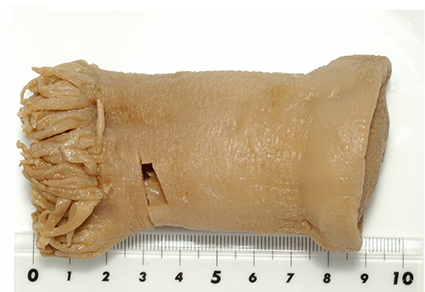Abstract
We describe a new sea anemone species, Synhalcurias kahakui sp. nov., from specimens collected off Otouto-jima and Amami-oshima islands in July 2016 and May 2019. respectively. These sea anemones were identified as belonging to family Actinernidae due to their many endocoelic perfect mesenteries and identified as belonging to the genus Synhalcurias Carlgren, 1914 because they have an oral disc without any developed lobes. Though this genus presently accommodates only one species, Synhalcurias elegans (Wassilieff, 1908), our specimens are smaller than the aforementioned species, have fewer mesenteries, lack nematocyst batteries on the column, and have two types of microbasic p-mastigophores on the mesenterial filaments. These specimens are described as Synhalcurias kahakui sp. nov. In view of the new species, the diagnosis of genus Synhalcurias is revised. In addition, we redescribe S. elegans based on newly specimens collected from Japan.
References
Andres, A. (1881) Prodromus neapolitanae actiniarum faunae addito generalis actiniarum bibliographiae catalogo. Mitteilungen aus der Zoologischen Station zu Neapel, 2, 305–371.
Carlgren, O. (1914) On the genus Porponia and related genera, Scottish National Antarctic Expedition. Transactions of the Royal Society of Edinburgh, 50, 49–71. https://doi.org/10.1017/S0080456800017270
Carlgren, O. (1918) Die Mesenterienanordnung der Halcuriiden. Kungliga Fysiografiska Sällskapets Handlingar, 29, 1–37.
Carlgren, O. (1925) Zur Kenntnis der Hexacorallen. Zoologischer Anzeiger, 65, 87–99.
Carlgren, O. (1949) A survey of the Ptychodactiaria, Corallimorpharia and Actiniaria. Kungliga Svenska Vetenskapsakademiens Handlingar, 1, 1–121.
Duchassaing de Fombressin, P. & Michelotti, G. (1864) Supplément au mémoire sur les Coralliaires des Antilles. Imprimerie Royale, Turin, 112 pp. https://doi.org/10.5962/bhl.title.105196
Fautin, D.G. (2013) Hexacorallians of the World. Available from: http://hercules.kgs.ku.edu/hexacoral/anemone2/index.cfm (accessed 2 January 2013)
Fautin, D.G. (2016) Catalog to families, genera, and species of orders Actiniaria and Corallimorpharia (Cnidaria: Anthozoa). Zootaxa, 4145 (1), 1–449. https://doi.org/10.11646/zootaxa.4145.1.1
Gusmão, L.C., Qu, C., Burke, S.L. & Rodríguez, E. (2020) Two new deep-sea species of burrowing anemones (Cnidaria: Actiniaria: Edwardsiidae) from Whittard Canyon off the southwestern coast of Ireland. American Museum Novitates, 2020, 1–25. https://doi.org/10.5962/bhl.title.11290
Gusmão, L.C. & Rodríguez, E. (2021) Deep-sea anemones (Cnidaria: Anthozoa: Actiniaria) from the South Atlantic. Bulletin of the American Museum of Natural History, 444, 1–69.
Hertwig, R. (1882) Die Actinien der Challenger Expedition. Gustav Fischer, Jena, 119 pp.
Hertwig, R. (1888) Report on the Actiniaria dredged by H.M.S. Challenger during the years 1873-1876 [Supplement]. Report on the Scientific Results of the Voyage of the H.M.S. Challenger during the years 1873–76, Zoology, 26, 1–56.
Izumi, T., Fujii, T. & Yanagi, K. (2019) Introduction to the latest classification system of Actiniaria and proposals for Japanese names of higher taxa. TAXA, 46, 54–63. [in Japanese]
Mariscal, R.N. (1974) Nematocysts. In: Muscatine, L. & Lenhoff, H.M. (Eds.), “Coelenterate Biology: Reviews and New Perspectives”. Academic Press, New York, New York, pp. 129–178. https://doi.org/10.1016/B978-0-12-512150-7.50008-6
Pax, F. (1910) Studien an westindischen Actinien. Zoologische Jahrbücher, Supplement 11, 157–330.
Presnell, J.K. & Schreibman, M.P. (1997) Humason’s Animal Tissue Techniques 5th Edition. Johns Hopkins University Press, Baltimore, Maryland, 572 pp.
Rasband, W.S. (1997–2012) ImageJ, U.S. National Institutes of Health, Bethesda, Maryland. Available from: http://imagej.nih.gov/ij/ (accessed 31 August 2021)
Rodríguez, E., Barbeitos, M.S., Brugler, M.R., Crowley, L.M., Grajales, A., Gusmão, L., Häussermann, V., Reft, A. & Daly, M. (2014) Hidden among sea anemones: the first comprehensive phylogenetic reconstruction of the Order Actiniaria (Cnidaria, Anthozoa, Hexacorallia) reveals a novel group of hexacorals. PLoS One, 9, 1–17. https://doi.org/10.1371/journal.pone.0096998
Stephenson, T.A. (1922) On the classification of Actiniaria. Part III.—Definitions connected with the forms dealt with in Part II. Quarterly Journal of Microscopical Science, 66, 247–319. https://doi.org/10.1242/jcs.s2-66.262.247
Uchida, H. (1992) Actiniaria. In: Nishimura, S. (Eds.), Guide to Seashore animals of Japan with Color Pictures and Keys. Vol. I. Hoikusha, Tokyo, pp. 126–146. [in Japanese]
Uchida, H. (2007) Actinologia japonica (2) on the actiniarian family Actinernidae from Japan. Kuroshio Biospheres, 3, 17–32.
Uchida, H. & Soyama, I. (2001) Sea Anemones in Japanese Waters. TBS, Tokyo, pp. 157. [in Japanese]
Wassilieff, A. (1908) Japanische Actinien. Abhandlungen des Mathematischen-Physikalischen Institutes der Kaiserlichen Bayerischen Akademie der Wissenschaften, Supplement 1, 1–49.
Yanagi, K., Fujii, T. & Hirose, M. (2015) Redescription of the sea anemone Exocoelactis actinostoloides (Cnidaria: Anthozoa: Actiniaria) based on a topotypic specimen collected from Tokyo Bay, Japan. Species Diversity, 20, 199–209. https://doi.org/10.12782/sd.20.2.199


